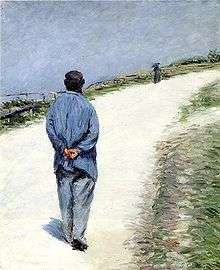Definify.com
Definition 2026
идти
идти
Russian
Alternative forms
Verb
идти́ • (idtí) impf (perfective пойти́) (concrete verbs)
- to go
- Идём в кинотеа́тр! ― Idjóm v kinoteátr! ― Let's go to the movie theater!
- to walk
- (of precipitation) to fall
- to function, work
- to suit, become (of wearing clothes)
- (used in expressions)
- Вре́мя идёт бы́стро. ― Vrémja idjót býstro. ― Time flies.
- Э́то ещё куда́ ни шло. ― Éto ješčó kudá ni šlo. ― That's still all right. (colloquial)
- Их това́ры иду́т хорошо́. ― Ix továry idút xorošó. ― Their products are selling well.
- О чём идёт речь?
- O čóm idjót rečʹ?
- What is being talked about? / What is it all about? / What is the topic? / What are you guys talking about?
- Всё идёт по пла́ну. ― Vsjó idjót po plánu. ― Everything is going as planned.
- Во ско́лько идёт э́та переда́ча? ― Vo skólʹko idjót éta peredáča? ― What time is this (television) program on?
- Э́то не идёт ни в како́е сравне́ние с че́м-нибудь/ке́м-нибудь.
- Éto ne idjót ni v kakóje sravnénije s čém-nibudʹ/kém-nibudʹ.
- It cannot be compared with something/someone.
- Речь идёт о двух/трёх ве́щах. ― Rečʹ idjót o dvux/trjóx véščax. ― [insert subject] is/are talking about two/three things.
- идти́ на компроми́сс ― idtí na kompromíss ― to compromise, make a compromise
- идти́ на усту́пки ― idtí na ustúpki ― to compromise, make concessions
- идти́ на риск ― idtí na risk ― to run a risk, take a chance
- идти́ на всё ― idtí na vsjó ― to be ready to do anything, go to any length
- идти́ по пята́м ― idtí po pjatám ― to follow in someone's footsteps; to follow on the heels of
Usage notes
Идти and пойти́ (pojtí) are Russian concrete verbs. Their counterpart, ходи́ть (xodítʹ), is an abstract verb.
Conjugation
Conjugation of идти́ (class irreg-b/b imperfective intransitive)
| imperfective aspect | ||
|---|---|---|
| infinitive | идти́ idtí |
|
| participles | present tense | past tense |
| active | иду́щий idúščij |
ше́дший šédšij |
| passive | — | — |
| adverbial | идя́ idjá |
ше́дши šédši |
| present tense | future tense | |
| 1st singular (я) | иду́ idú |
бу́ду идти́ búdu idtí |
| 2nd singular (ты) | идёшь idjóšʹ |
бу́дешь идти́ búdešʹ idtí |
| 3rd singular (он/она́/оно́) | идёт idjót |
бу́дет идти́ búdet idtí |
| 1st plural (мы) | идём idjóm |
бу́дем идти́ búdem idtí |
| 2nd plural (вы) | идёте idjóte |
бу́дете идти́ búdete idtí |
| 3rd plural (они́) | иду́т idút |
бу́дут идти́ búdut idtí |
| imperative | singular | plural |
| иди́ idí |
иди́те idíte |
|
| past tense | singular | plural (мы/вы/они́) |
| masculine (я/ты/он) | шёл šól |
шли́ šlí |
| feminine (я/ты/она́) | шла́ šlá |
|
| neuter (оно́) | шло́ šló |
|
Pre-reform conjugation of идти́ (class irreg-b/b imperfective intransitive)
| imperfective aspect | ||
|---|---|---|
| infinitive | идти́ idtí |
|
| participles | present tense | past tense |
| active | иду́щій idúščij |
ше́дшій šédšij |
| passive | — | — |
| adverbial | идя́ idjá |
ше́дши šédši |
| present tense | future tense | |
| 1st singular (я) | иду́ idú |
бу́ду идти́ búdu idtí |
| 2nd singular (ты) | идёшь idjóšʹ |
бу́дешь идти́ búdešʹ idtí |
| 3rd singular (он/она́/оно́) | идётъ idjót |
бу́детъ идти́ búdet idtí |
| 1st plural (мы) | идёмъ idjóm |
бу́демъ идти́ búdem idtí |
| 2nd plural (вы) | идёте idjóte |
бу́дете идти́ búdete idtí |
| 3rd plural (они́) | иду́тъ idút |
бу́дутъ идти́ búdut idtí |
| imperative | singular | plural |
| иди́ idí |
иди́те idíte |
|
| past tense | singular | plural (мы/вы/они́) |
| masculine (я/ты/он) | шёлъ šól |
шли́ šlí |
| feminine (я/ты/она́) | шла́ šlá |
|
| neuter (оно́) | шло́ šló |
|
Derived terms
- See also ходи́ть (xodítʹ) for further terms derived from that verb.
|
imperfective
|
perfective
|
See also
- ходи́ть (xodítʹ)
References
- Fasmer, Maks (1964–1973), “иду”, in Etimologičeskij slovarʹ russkovo jazyka [Etymological Dictionary of the Russian Language] (in Russian), translated from German and supplemented by Trubačev O. N., Moscow: Progress
- Černyx, P. Ja. (1999), “идти”, in Istoriko-etimologičeskij slovarʹ russkovo jazyka [Historical-Etymological Dictionary of the Russian Language] (in Russian), volume 1, 3rd reprint edition, Moscow: Russkij jazyk, page 337
